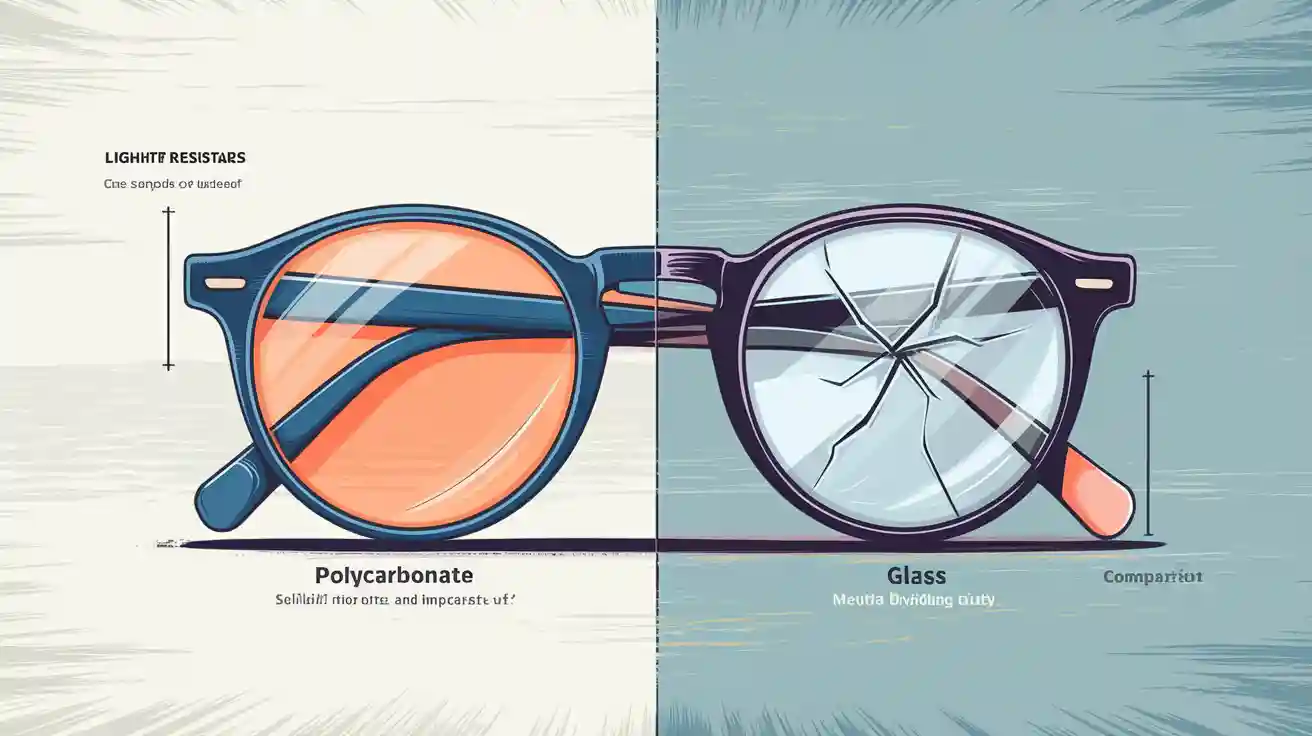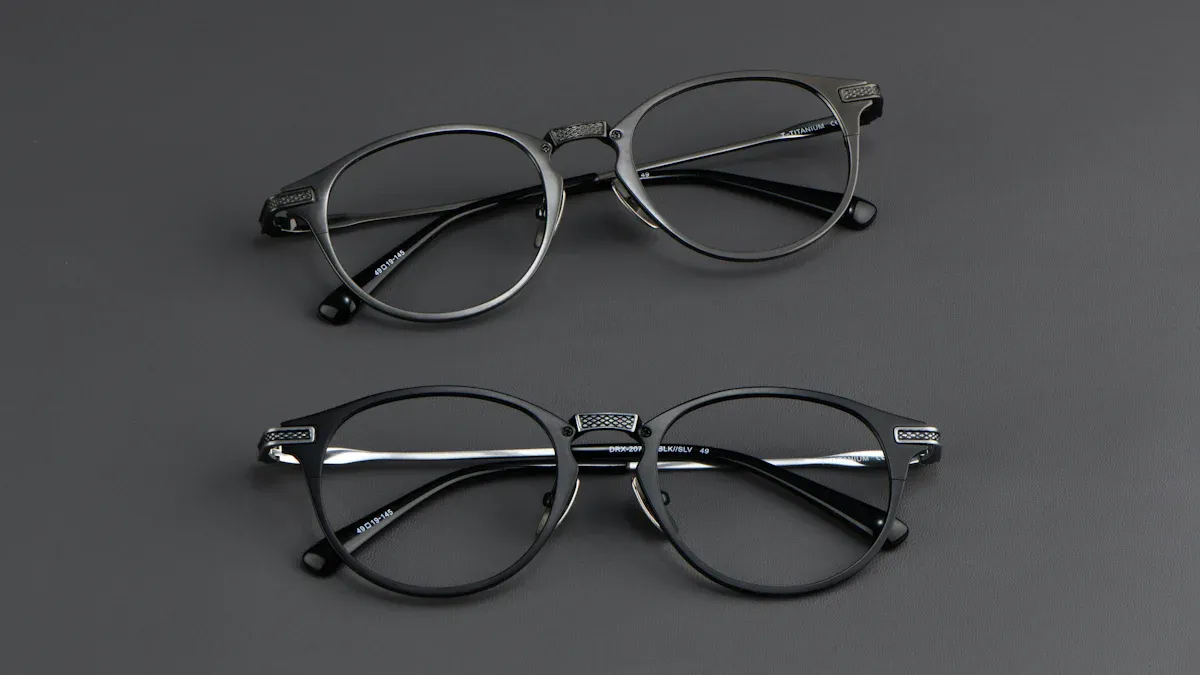
When it comes to strength, not all lenses are the same, especially when comparing polycarbonate lenses vs glass. Polycarbonate lenses are light and very tough against impacts, making them about 10 times stronger than regular plastic or glass lenses. This durability makes them great for kids and people who play sports. On the other hand, glass lenses are better at resisting scratches and maintaining clarity. They provide sharper vision due to their higher refractive index. Whether you love outdoor activities or want super clear vision, understanding the differences between polycarbonate lenses vs glass helps you choose wisely.
Key Takeaways
Polycarbonate lenses are much stronger than glass. They are great for kids and active people.
Glass lenses give clearer vision and resist scratches better. However, they can break if dropped.
Polycarbonate lenses are light and comfy to wear all day. Glass lenses can feel heavier.
Pick polycarbonate lenses for strength and UV protection. Choose glass lenses for clear vision and scratch resistance.
Think about your daily activities when picking lenses. Tell your eye doctor about your habits for good advice.
Polycarbonate Lenses vs Glass: Material Overview
What Are Polycarbonate Lenses?
Polycarbonate lenses are made from strong, lightweight plastic. They don’t break easily like glass lenses, making them safer for kids and active people. These lenses are often used in safety goggles and sports glasses. They also block all UV rays naturally, so no extra coatings are needed to protect your eyes from sunlight.
Polycarbonate lenses are 10 times tougher than glass. This makes them great for outdoor activities and sports. They work well for prescription glasses and sunglasses too. However, they can scratch more easily than glass, so you might need scratch-resistant coatings or handle them carefully.
Here’s a simple comparison of their features:
Feature |
Polycarbonate Lenses |
|---|---|
Strength |
Very strong, great for many uses. |
Clarity |
Clear, but not as sharp as glass. |
Impact Resistance |
Extremely resistant to breaking. |
UV Protection |
Blocks all UV rays naturally. |
If you want safe, durable lenses that protect against UV rays, polycarbonate lenses are a smart pick.
What Are Glass Lenses?
Glass lenses are known for their clear vision and scratch resistance. They give the sharpest vision because of their high refractive index. Glass lenses don’t scratch easily, so they stay looking new longer.
But glass lenses are heavier than polycarbonate ones, which can feel less comfortable for long wear. They can break if dropped, making them less durable. Glass lenses don’t block UV rays naturally, but you can add coatings for UV protection.
Here’s a quick look at glass lens features:
Feature |
Glass Lenses |
|---|---|
Weight |
Heavier, may feel less comfy. |
Impact Resistance |
Can break if dropped. |
UV Protection |
Needs coatings for UV protection. |
Clarity |
Offers the clearest vision. |
Scratch Resistance |
Hard to scratch, stays nice longer. |
Strong Prescriptions |
Works well for strong prescriptions. |
Glass lenses are ideal for people who want clear vision and scratch resistance over lightweight comfort.
Durability Factors Compared
Impact Resistance
Polycarbonate lenses are the best for impact resistance. They are built to handle tough situations, making them great for safety glasses and sports eyewear. If you drop your glasses or they get hit, polycarbonate lenses are less likely to break. These lenses are one of the strongest options for impacts. This makes them perfect for active people or risky environments.
Glass lenses don’t do as well in this area. They give clear vision but can break easily if hit hard. Dropping glasses with glass lenses can cause chips or cracks. This can be dangerous, especially for kids or those in high-impact activities.
The EN 166 certification proves polycarbonate lenses are better for impact protection. They are not only strong but also lightweight, so they’re comfy to wear for long periods. Glass lenses are strong in other ways but can’t match polycarbonate for impact resistance.
Scratch Resistance
Glass lenses are great at resisting scratches. They can handle daily use without losing their clear look. You don’t have to worry much about small scratches from cleaning or rough surfaces. This makes glass lenses a good choice if you want long-lasting clarity.
Polycarbonate lenses scratch more easily. While they are strong against impacts, they need a scratch-resistant coating to last as long as glass lenses. Without this coating, small scratches can build up and affect your vision.
If you clean your glasses often or toss them in a bag, glass lenses might work better for you. But polycarbonate lenses can still be good. With the right coating, they can handle daily use well.
Longevity
How long your lenses last depends on how you use them. Glass lenses last longer because they resist scratches naturally. They stay clear and look good even with regular use. If you take care of them, glass lenses can last for years.
Polycarbonate lenses are very strong against impacts but may wear out faster without a scratch-resistant coating. However, they are lightweight and block UV rays, which is useful for many people. If you’re active or outdoors a lot, polycarbonate lenses are still a great choice.
In the end, your lifestyle decides which lens is better. If you need lenses that handle impacts and block UV rays, pick polycarbonate. If you want lenses that resist scratches and stay clear for a long time, go with glass.
Benefits of Polycarbonate Lenses
Lightweight Design
Polycarbonate lenses are super light and easy to wear. Unlike glass lenses, they don’t feel heavy on your face. You might even forget you’re wearing glasses! This makes them great for long days at school, work, or outside.
Because they’re so light, they don’t press on your nose or ears. If your old glasses left marks or felt uncomfortable, polycarbonate lenses can fix that. Whether you’re hiking, running errands, or just relaxing, these lenses keep you comfy all day.
Flexibility and Safety
Polycarbonate lenses are flexible and very safe. They don’t break easily like glass lenses. Studies show they handle impacts better than other lens materials. This makes them perfect for sports, construction, or if you drop your glasses often.
Their flexibility helps them last longer. Instead of breaking, they bend slightly to absorb force. Tests prove how strong they are under tough conditions. If you want safe and durable lenses, polycarbonate is a great choice.
UV Protection
Polycarbonate lenses block harmful UV rays naturally. You don’t need extra coatings to protect your eyes from the sun. Research shows they block 99.9% of UV rays, which is great for outdoor activities or protecting your eye health.
Compared to glass lenses, polycarbonate lenses offer better UV protection without being heavy. They’re not just strong and light—they also help keep your eyes safe from sun damage. Whether you’re driving or at the beach, these lenses protect your eyes well.
Additional Considerations
Weight and Comfort
Polycarbonate lenses are super light and easy to wear. They don’t press on your nose or ears, so they feel comfy. If you wear glasses all day, these lenses are a great choice. They’re perfect for school, work, or outdoor fun.
Glass lenses are heavier than polycarbonate ones. While they give clear vision, the weight can feel uncomfortable. You might notice marks on your nose or feel pressure on your skin. If comfort is what you need most, polycarbonate lenses are the better option.
Cost and Accessibility
Price and availability are important when picking lenses. Polycarbonate lenses are usually cheaper and easy to find. You can get them online or at most optical stores. They’re a good choice if you want strong, lightweight lenses without spending too much.
Glass lenses cost more because they resist scratches and offer sharp vision. They’re great if you want top quality and don’t mind paying extra. But they might not fit everyone’s budget.
Here’s a simple cost comparison:
Lens Type |
Cost Comparison |
|---|---|
Polycarbonate |
|
Glass |
In the end, your choice depends on what you value—saving money or premium features.
Which Lens Is Best for Durability?

Strengths and Weaknesses
When choosing durable lenses, both polycarbonate lenses and glass lenses have pros and cons. Knowing these can help you pick the right one.
Strengths of Polycarbonate Lenses:
They are 10 times stronger against impacts than plastic lenses. This makes them great for active people or accident-prone situations.
Instead of breaking, polycarbonate lenses bend when hit. Whether it’s a flying ball or gravel, they can handle tough hits.
They are much lighter than glass lenses, making them more comfortable to wear daily.
Weaknesses of Polycarbonate Lenses:
They resist impacts well but scratch more easily than glass. Adding a scratch-resistant coating helps keep them clear.
Strengths of Glass Lenses:
Glass lenses offer the clearest vision, perfect for those who want sharp eyesight.
They naturally resist scratches, staying in good condition for a long time.
Weaknesses of Glass Lenses:
Glass lenses can break or shatter if dropped or hit hard. Even newer types aren’t as tough as polycarbonate lenses in risky situations.
They are heavier, which can feel less comfortable for all-day use.
Tip: For impact safety, polycarbonate lenses are the best choice. But if you care more about scratch resistance and clear vision, glass lenses might suit you better.
Picking between polycarbonate lenses and glass lenses depends on your needs. If you’re active or need tough glasses, choose polycarbonate lenses. They are light, strong, and block UV rays naturally. But if you want super clear vision and scratch resistance, go for glass lenses.
Tip: Share your daily habits and likes with your eye doctor. They can guide you to the best lenses for your lifestyle.
FAQ
1. Are polycarbonate lenses good for kids?
Yes, they’re great for kids! Polycarbonate lenses don’t break like glass. They’re light, so kids can wear them all day. They also block UV rays, keeping eyes safe outside.
2. Are glass lenses good for sports or outdoor fun?
Not really. Glass lenses can break if dropped or hit. This makes them unsafe for active use. Polycarbonate lenses are better since they’re strong, flexible, and light.
3. Can I add scratch protection to polycarbonate lenses?
Yes! You can get scratch-resistant coatings for polycarbonate lenses. These coatings protect against scratches and keep lenses clear. Ask your optician to add this feature.
4. Which lenses are best for strong prescriptions?
Glass lenses are best for strong prescriptions. They give sharper vision with thinner lenses. Polycarbonate lenses are light but may not be as clear for high prescriptions.
5. Are polycarbonate lenses cheaper than glass lenses?
Yes, polycarbonate lenses usually cost less. They’re easy to find and durable. Glass lenses cost more because they resist scratches and offer clearer vision.
Tip: Not sure which lens is right for you? Ask your optician! They’ll help you choose the best option for your lifestyle.







